Articles
- Page Path
- HOME > J Korean Acad Nurs > Volume 41(3); 2011 > Article
-
Original Article
- Effects of Laughter Therapy on Depression, Quality of Life, Resilience and Immune Responses in Breast Cancer Survivors
- Eun A Cho, Hyun Ei Oh
-
Journal of Korean Academy of Nursing 2011;41(3):285-293.
DOI: https://doi.org/10.4040/jkan.2011.41.3.285
Published online: June 13, 2011
1Full-time Lecturer, Department of Nursing, Honam University, Gwangju, Korea.
2Professor, Department of Nursing, Chosun University, Gwangju, Korea.
- Address reprint requests to: Oh, Hyun Ei. Department of Nursing, Chosun University, 375 Seoseok-dong, Dong-gu, Gwangju 501-759, Korea. Tel: +82-10-3612-3683, Fax: +82-62-230-6322, hyoh@chosun.ac.kr
© 2011 Korean Society of Nursing Science
Abstract
-
Purpose
- In this study, the effects of laughter therapy on levels of depression, quality of life, resilience and immune responses in breast cancer survivors were examined.
-
Methods
- A quasi-experimental nonequivalent control group, pretest-posttest design was used. Participants (n=37) included breast cancer survivors who finished chemotheraphy and radiation therapy: 16 in the experiment group and 21 in the control group. Data were collected from August to November 2009. The experimental group participated in laughter therapy eight times, twice a week for 60 min per session. Questionnaires were used to me-asure pretest and posttest levels of depression, quality of life and resilience. A blood test was used to analyze changes in Total T cell, T helper, T suppressor, Th/Ts ratio, Total B cell, T cell/B cell ratio and NK cell for immune responses.
-
Results
- The results showed that laughter therapy was effective in increasing the quality of life and resilience in breast cancer survivors. but depression and immune responses did not differ significantly between the groups.
-
Conclusion
- The results of the study indicate that laughter therapy may be an effective nursing intervention to improve quality of life and resilience in breast cancer survivors.
- 1. Beck AT, Steer RA, Brown GK. Manual for the BDI-II. 1996;San Antonio, TX, Psychological Corporation.
- 2. Beckman H, Regier N, Young J. Effect of workplace laughter groups on personal efficacy beliefs. Journal of Primary Prevention. 2007;28:167–182. doi:10.1007/s10935-007-0082-z.ArticlePubMedPDF
- 3. Bennett MP, Lengacher CA. Humor and laughter may influence health: I. History and background. Evidence-Based Complementary and Alternative Medicine. 2006;3:61–63. doi:10.1093/ecam/nek015.ArticlePubMedPMCPDF
- 4. Bennett MP, Lengacher CA. Humor and laughter may influence health: IV. Humor and immune function. Evidence-Based Complementary and Alternative Medicine. 2009;6:159–164. doi:10.1093/ecam/nem149.ArticlePubMedPDF
- 5. Cella D. FACIT manual: Manual of the functional assessment of chronic illness therapy scales. 1997;Evanston, Northwestern Healthcare and Northwestern university, Evanston. Unpublished manuscript.
- 6. Cho OH. Effective of a comprehensive rehabilitation program for mastectomy patients. Journal of Korean Academy of Nursing. 2004;34:809–819.PubMed
- 7. Cohen J. Statistical power analysis for the behavioral science. 1998;2nd ed. Hiillsdale, NJ, Lawrence Erlbaum Associates.
- 8. Fairey AS, Courneya KS, Field CJ, Mackey JR. Physical exercise and immune system function in cancer survivors: A comprehensive review and future directions. Cancer. 2002;94:539–551. doi:10.1002/cncr.10244.ArticlePubMed
- 9. Goodwin PJ, Ennis M, Bordeleau LJ, Pritchard KI, Trudeau ME, Koo J, et al. Health-related quality of life and psychosocial status in breast cancer prognosis: Analysis of multiple variables. Journal of Clinical Oncology. 2004;22:4184–4192. doi:10.1200/JCO.2004.12.091.ArticlePubMed
- 10. Haase JE. The adolescent resilience model as a guide to interventions. Journal of Pediatric Oncology Nursing. 2004;21:289–299. doi:10.1177/1043454204267922.ArticlePubMedPDF
- 11. Heo EH. Effect of laughter on mood, stress response and health-related quality of life among hemodialysis patients. 2007;Pochon, Pochon CHA University. Unpublished master's thesis.
- 12. Kang DH, Weaver MT, Park NJ, Smith B, McArdle T, Carpenter JS. Significant impairment in immune recovery after cancer treatment. Nursing Research. 2009;58:105–114. doi:10.1097/NNR.0b013e31818fcecd.ArticlePubMedPMC
- 13. Kim H, Lee KH, Kim JC, Chung HY, Yoo HJ, Lee JH, et al. Development and validation of Korean Functional Assessment Cancer Therapy-General (FACT-G). Korean Journal of Clinical Psychology. 2003;22:215–229.
- 14. Kim KS, Lee SW, Choe MA, Yi MS, Choi S, Kwon SH. Effects of abdominal breathing training using biofeedback on stress, immune response and quality of life in patients with a mastectomy for breast cancer. Journal of Korean Academy of Nursing. 2005;35:1295–1303.ArticlePubMedPDF
- 15. Kim MS, Chyon MS. Effects of the self-help group program for quality of life in women with breast cancer. Journal of Korean Oncology Nursing. 2003;3:45–55.
- 16. Kim NC, Kim HS, Yu YS, Yong JS, Song MS. Disease-related stress experienced by women with mastectomy: Q methodology. Korean Journal of Women Health Nursing. 2003;9:379–389.ArticlePDF
- 17. Kim SH, Kim YH, Kim HJ, Lee SH, Yu SO. The effect of laughter therapy on depression, anxiety, and stress in patients with breast cancer undergoing radiotherapy. Journal of Korean Oncology Nursing. 2009;9:155–162.
- 18. Kim YS, Cheon SS. The influence of laughter on stress response in the elderly. Journal of Korean Academy of Psychiatric and Mental Health Nursing. 2009;18:269–277.
- 19. Lam WW, Bonanno GA, Mancini AD, Ho S, Chan M, Hung WK, et al. Trajectories of psychological distress among Chinese women diagnosed with breast cancer. Psycho-oncology. 2010;19:1044–1051. doi:10.1002/pon.1658.ArticlePubMedPDF
- 20. Lee IS. The effects of laughter therapy on the anxiety and depression of patients with cancer. 2009;Seoul, Seoul Social Welfare Graduate University. Unpublished master's thesis.
- 21. Lee JS, Kim KS, Kim MY, Oh SM, Oh SH, Lee HS. Effect of laughter therapy on sleep disorders, depression with hemodialysis patients. Journal of Clinical Nursing Research (Ewha Womans University Medical Center). 2006;9:107–150.
- 22. Min HS, Park SY, Lim JS, Park MO, Won HJ, Kim JI. A study on behavior for preventing recurrence and quality of life in breast cancer survivors. Journal of Korean Academy of Nursing. 2008;38:187–194. doi:10.4040/jkan.2008.38.2.187.PubMed
- 23. 2006-2007 National cancer statistics press release. National Cancer Information Center. 2009;Retrieved November 12, 2008. from http://www.cancer.go.kr.
- 24. Park HS, Cho GY, Park KY. The effects of a rehabilitation program on physical health, physiological indicator and quality of life in breast cancer mastectomy patients. Journal of Korean Academy of Nursing. 2006;36:310–320.ArticlePubMedPDF
- 25. Park JH, Jun EY, Kang MY, Joung YS, Kim GS. Symptom experience and quality of life in breast cancer survivors. Journal of Korean Academy of Nursing. 2009;39:613–621. doi:10.4040/jkan.2009.39.5.613.ArticlePubMed
- 26. Ryu CH, Lee SJ. Comparison of effects of the laughter therapy and the cognitive behavior therapy on anger reduction in adolescents with juvenile delinquents. Korean Journal of Clinical Psychology. 2009;28:55–79.
- 27. Song YS. Determinants of resilience of the physically disabled at home. 2004;Busan, Kosin University. Unpublished master's thesis.
- 28. Sung HM, Kim JB, Park YN, Bai DS, Lee SH, Ahn HY. A study on the reliability and the validity of Korean version of the Beck depression inventory-II (BDI-II). Journal of the Korean Society of Biological Therapies in Psychiatry. 2008;14:201–212.
- 29. Von Ah D, Kang DH, Carpenter JS. Stress, optimism, and social support: Impact on immune responses in breast cancer. Research in Nursing and Health. 2007;30:72–83. doi:10.1002/nur.20164.ArticlePubMed
- 30. Wagnild GM, Young HM. Development and psychometric evaluation of the resilience scale. Journal of Nursing Measurement. 1993;1:165–178.PubMed
REFERENCES
Figure & Data
REFERENCES
Citations

- ‘If I didn't laugh, I would cry’: a qualitative study of older adults' humour experiences: associations with gender and well-being
Heather Heap, Gil Greengross, Charles Musselwhite
Cogent Gerontology.2026;[Epub] CrossRef - The effect of laughter yoga’s on perceived stress and anxiety levels in nursing students: Randomized controlled trial
Hakime Aslan, Abdurrahman Akçin, Hanife Çeli̇k
Advances in Integrative Medicine.2025; 12(1): 49. CrossRef - The Effects of Laughter Therapy on Perceived Stress and Quality of Life in Women With Breast Cancer Receiving Chemotherapy
Hacer Karakas, Pinar Zorba Bahceli, Murat Akyol
Cancer Nursing.2024;[Epub] CrossRef - Impact of Laughter Yoga on Test Anxiety and Education Stress of 8th Grade Students: An Experimental Study
Bilge Kalanlar, Nilgün Kuru Alıcı
Creative Nursing.2024; 30(4): 280. CrossRef - Laughter Interventions to Improve Psychological Well-Being/QoL in Cancer Patients: A Mini Systematic Review
Anastasia Olympiou, Sana Ahmed
Sage Open.2024;[Epub] CrossRef - The Effects of Laughter Yoga on the Psychological Well-Being of Women Diagnosed with Gynecologic Cancer
Zuhal Karagöz İnce, Kerime Derya Beydağ
Cyprus Turkish Journal of Psychiatry and Psychology.2024; 6(4): 339. CrossRef - Significance of music therapy in treating depression and anxiety disorders among people with cancer
Chiedu Eseadi, Millicent O Ngwu
World Journal of Clinical Oncology.2023; 14(2): 69. CrossRef - The Effect of Laughter Therapy/Yoga on Physical and Mental Health: A Review of Nursing Graduate Theses
Özkan UĞUZ
Kastamonu Üniversitesi Sağlık Bilimleri Fakültesi Dergisi.2023; 2(3): 148. CrossRef - The effect of laughter yoga on loneliness, psychological resilience, and quality of life in older adults: A pilot randomized controlled trial
Fatma Özlem Öztürk, Emine Pirinç Bayraktar, Ayfer Tezel
Geriatric Nursing.2023; 50: 208. CrossRef - The Effects of Laughter Yoga on Perceived Stress, Positive Psychological Capital, and Exercise Capacity in Lung Cancer Chemotherapy Patients: A Pilot Randomized Trial
Shuangrong Han, Luyao Zhang, Qiufang Li, Xiaokai Wang, Shali Lian
Integrative Cancer Therapies.2023;[Epub] CrossRef - Resilience and Related Factors: A Comparison of Fathers and Mothers of Patients With Cleft Lip and/or Palate in China
Lulu Yuan, Yuqin Gao, Bochen Pan, Junyan Wang, Yanjie Wang, Caixia Gong, Weiren Wang, Xiaohan Li
Frontiers in Psychiatry.2022;[Epub] CrossRef - Effects of an Interdisciplinary Integrative Oncology Group-Based Program to Strengthen Resilience and Improve Quality of Life in Cancer Patients: Results of a Prospective Longitudinal Single-Center Study
Burcu Babadağ Savaş, Bettina Märtens, Holger Cramer, Petra Voiss, Julia Longolius, Axel Weiser, Yvonne Ziert, Hans Christiansen, Diana Steinmann
Integrative Cancer Therapies.2022;[Epub] CrossRef - Resilience in Women who Underwent Breast Cancer Surgery
Hatice BALCI, Şule BALCI ŞENER
Akdeniz Medical Journal.2022; : 347. CrossRef - Associations among resilience, hope, social support, stress, and anxiety severity in Chinese women with abnormal cervical cancer screening results
Xue Wang, Suyan Wang, Dan Yang, Yuying Chu, Yuanyuan Hao, Hongliang Dai
Heliyon.2022; 8(12): e12539. CrossRef - The Effect of Laughter Therapy on Anxiety, Depression and Stress of Cancer Patients Admitted to Long-Term Care Unit
Seongeun Kim, Miseon Kim, Hyeoncheol Jeong
Physical Therapy Rehabilitation Science.2021; 10(2): 197. CrossRef - GELENEKSEL VE TAMAMLAYICI TIP UYGULAMALARININ GÜLEN YÜZÜ: KAHKAHA YOGASI
Zülfünaz ÖZER, Sebahat AKBAL ATEŞ
Journal of Anatolia Nursing and Health Sciences.2021;[Epub] CrossRef - The Effects of Depression Intervention Programs for Breast Cancer Patients in Korea: A Systematic Review and Meta-Analysis
Hyun-Joo Park, Hye Gyeong Son
Asian Oncology Nursing.2020; 20(4): 150. CrossRef - The effects of laughter therapy on depression symptoms in patients undergoing center hemodialysis: A pragmatic randomized controlled trial
Paul N. Bennett, Wael F. Hussein, Marc Reiterman, Junhua Yu, Brigitte Schiller
Hemodialysis International.2020; 24(4): 541. CrossRef - Effects of a laughter programme with entrainment music on stress, depression, and health-related quality of life among gynaecological cancer patients
Yong Jin Lee, Myung Ah Kim, Hye-Ja Park
Complementary Therapies in Clinical Practice.2020; 39: 101118. CrossRef - The Effect of Laughter Therapy on Anxiety
Melike Demir Doğan
Holistic Nursing Practice.2020; 34(1): 35. CrossRef - An intervention based on protective factors to improve resilience for breast cancer patients: Study protocol for a randomized controlled trial
Xiaoxiao Jiang, Yajuan Yang, Huiping Li, Shuwen Li, Dan Su, Ting Zhang, Maomao Zhang
Journal of Advanced Nursing.2019; 75(11): 3088. CrossRef - Resilience in Koreans With Cancer
Shin-Young Lee, Haeok Lee, Jacqueline Fawcett, Jeong-Hwan Park
Journal of Hospice & Palliative Nursing.2019; 21(5): 358. CrossRef - Laughter-inducing therapies: Systematic review and meta-analysis
C. Natalie van der Wal, Robin N. Kok
Social Science & Medicine.2019; 232: 473. CrossRef - Resilience and associated factors among Chinese patients diagnosed with oral cancer
Yuqin Gao, Lulu Yuan, Bochen Pan, Lie Wang
BMC Cancer.2019;[Epub] CrossRef - Non-pharmacological therapies for depressive symptoms in breast cancer patients: Systematic review and meta-analysis of randomized clinical trials
Liliana Coutiño-Escamilla, Maricela Piña-Pozas, Aurelio Tobías Garces, Brenda Gamboa-Loira, Lizbeth López-Carrillo
The Breast.2019; 44: 135. CrossRef - Factors Influencing Sick Role Behavior Compliance in Patients on Hemodialysis
Hyun Mi Jeon, Hye Sook You
Journal of Korean Academy of Fundamentals of Nursing.2019; 26(1): 23. CrossRef - Psychological intervention and its immune effect in cancer patients
Ping Zhang, Lin Mo, Xia Li, Qiyao Wang
Medicine.2019; 98(38): e17228. CrossRef - Factors promoting resilience among breast cancer patients: a qualitative study
Ting Zhang, Huiping Li, Annuo Liu, Huixue Wang, Yaqi Mei, Wanjun Dou
Contemporary Nurse.2018; 54(3): 293. CrossRef - Factors Influencing Resilience of Burn Patients in South Korea
Mi Heui Jang, Jongui Park, Mi Kyong Chong, Sohyune R. Sok
Journal of Nursing Scholarship.2017; 49(5): 478. CrossRef - The effect of laughter therapy on the quality of life of nursing home residents
Nilgun Kuru, Gulumser Kublay
Journal of Clinical Nursing.2017; 26(21-22): 3354. CrossRef - Affective immunology: where emotions and the immune response converge
Fulvio D'Acquisto
Dialogues in Clinical Neuroscience.2017; 19(1): 9. CrossRef - The Effects of Integrated Intervention Program for Community Dwelling Cancer Patients' Quality of Life, Depression and Self Care Agency
Young Sil Kang, In Soo Kwon, Eunyoung Hong
Journal of Korean Public Health Nursing.2016; 30(3): 445. CrossRef - The relationship between sense of humor, stress and depression in the nursing students
Hae Jin Lee, Ye Jung Ko, Seung Woo Han
Journal of the Korean Data and Information Science Society.2016; 27(4): 1035. CrossRef - Experiences of Self-management Support among Breast Cancer Survivors
Seok-Mo Heo, Narae Heo
Korean Journal of Adult Nursing.2016; 28(4): 470. CrossRef - The Mediating Effect of Resilience on Depression and Rehabilitation Motivation in Stroke Patients
Eun Sil Choi, Eun Nam Lee, Jeong Lim Cho
Journal of muscle and joint health.2016; 23(1): 19. CrossRef - Therapeutic Benefits of Laughter in Mental Health: A Theoretical Review
JongEun Yim
The Tohoku Journal of Experimental Medicine.2016; 239(3): 243. CrossRef - Perspectives on Living With Fibromyalgia
Ann Gill Taylor, Katharine E. Adelstein, Tamara G. Fischer-White, Maheswari Murugesan, Joel G. Anderson
Global Qualitative Nursing Research.2016;[Epub] CrossRef - Effect and Path Analysis of Laughter Therapy on Serotonin, Depression and Quality of Life in Middle-aged Women
Mi Youn Cha, Hae Sook Hong
Journal of Korean Academy of Nursing.2015; 45(2): 221. CrossRef - Effects of Laughter Therapy on Immune Responses in Postpartum Women
Kyung Hee Ryu, Hye Sook Shin, Eun Young Yang
The Journal of Alternative and Complementary Medicine.2015; 21(12): 781. CrossRef - Adult Congenital Heart Disease-Coping And REsilience (ACHD-CARE): Rationale and methodology of a pilot randomized controlled trial
Adrienne H. Kovacs, Mimi Bandyopadhyay, Sherry L. Grace, Amanda C. Kentner, Robert P. Nolan, Candice K. Silversides, M. Jane Irvine
Contemporary Clinical Trials.2015; 45: 385. CrossRef - Laughter and Stress Relief in Cancer Patients: A Pilot Study
S. H. Kim, Y. H. Kim, H. J. Kim
Evidence-Based Complementary and Alternative Medicine.2015; 2015: 1. CrossRef - The Effects of Laughter Therapy on Mood State and Self-Esteem in Cancer Patients Undergoing Radiation Therapy: A Randomized Controlled Trial
So Hee Kim, Jeong Ran Kook, Moonjung Kwon, Myeong Ha Son, Seung Do Ahn, Yeon Hee Kim
The Journal of Alternative and Complementary Medicine.2015; 21(4): 217. CrossRef - A clinical randomized controlled trial of music therapy and progressive muscle relaxation training in female breast cancer patients after radical mastectomy: Results on depression, anxiety and length of hospital stay
Kaina Zhou, Xiaomei Li, Jin Li, Miao Liu, Shaonong Dang, Duolao Wang, Xia Xin
European Journal of Oncology Nursing.2015; 19(1): 54. CrossRef - Effects of Emotional Labor, Somatic Symptoms, and Emotional Support on Quality of Life among Middle-aged Female Workers
Hae Ok Jeon, Yoorim Kweon
Korean Journal of Adult Nursing.2015; 27(5): 537. CrossRef - Resilience and Related Factors for Patients with Breast Cancer
Eunmi Kim, Sanghee Kim, Sue Kim, Yoonju Lee
Asian Oncology Nursing.2015; 15(4): 193. CrossRef - Laughter and Humor Therapy in Dialysis
Paul N. Bennett, Trisha Parsons, Ros Ben‐Moshe, Melissa Weinberg, Merv Neal, Karen Gilbert, Helen Rawson, Cherene Ockerby, Paul Finlay, Alison Hutchinson
Seminars in Dialysis.2014; 27(5): 488. CrossRef - Effects of Laughter Therapy on Depression in elderly
Mi Young Chang
Journal of Digital Convergence.2014; 12(6): 501. CrossRef - Effect of Intervention Programs for Improving Maternal Adaptation in Korea: Systematic Review
Hee Sun Kang, Soo Young Yeom, Eun-Young Jun
Korean Journal of Women Health Nursing.2013; 19(3): 153. CrossRef - Effects of Resilience on Work Engagement and Burnout of Clinical Nurses
Inn Oh Moon, Sook Kyoung Park, Jung Mi Jung
Journal of Korean Academy of Nursing Administration.2013; 19(4): 525. CrossRef - Effects of Visiting Laughter Therapy on Depression and Insomnia among the Vulnerable Elderly
Eunok Park
Journal of Korean Academy of Community Health Nursing.2013; 24(2): 205. CrossRef - Effects of the Laughter Therapy on Blood Pressure, Depression and Quality of life in Rural Elderly Women
Hae-Kyung Lee, Do-Hwa Byeon, Yang-Sook Park, Jin-Soon Kim, Jung-Hee Gil
Journal of the Korea Academia-Industrial cooperation Society.2013; 14(4): 1810. CrossRef - Development and Evaluation of the Psychosocial Distress Nursing Intervention for Patients with Gynecological Cancer
Jeong-Sook Park, Yun-Jung Oh
Korean Journal of Adult Nursing.2012; 24(3): 219. CrossRef - An Effect of Optimism, Self-esteem and Depression on Laughter Therapy of Menopausal Women
Mi Youn Cha, Yeon Kyung Na, Hae Sook Hong
Korean Journal of Women Health Nursing.2012; 18(4): 248. CrossRef
Laughter Therapy Program Contents
Homogeneity Test of General Characteristics (N=37)
*Fisher's exact probability test; Exp.=experimental group; Cont.=control group.
Homogeneity Test of Dependent Variables at Pre-test (N=37)
Exp.=experimental group; Cont.=control group.
The Effects of Laughter Therapy on Depression, Quality of Life, Resilience (N=37)
Exp.=experimental group; Cont.=control group.
The Effects of Laughter Therapy on Immune Responses (N=37)
Exp.=experimental group; Cont.=control group.
*Fisher's exact probability test; Exp.=experimental group; Cont.=control group.
Exp.=experimental group; Cont.=control group.
Exp.=experimental group; Cont.=control group.
Exp.=experimental group; Cont.=control group.
 KSNS
KSNS
 E-SUBMISSION
E-SUBMISSION
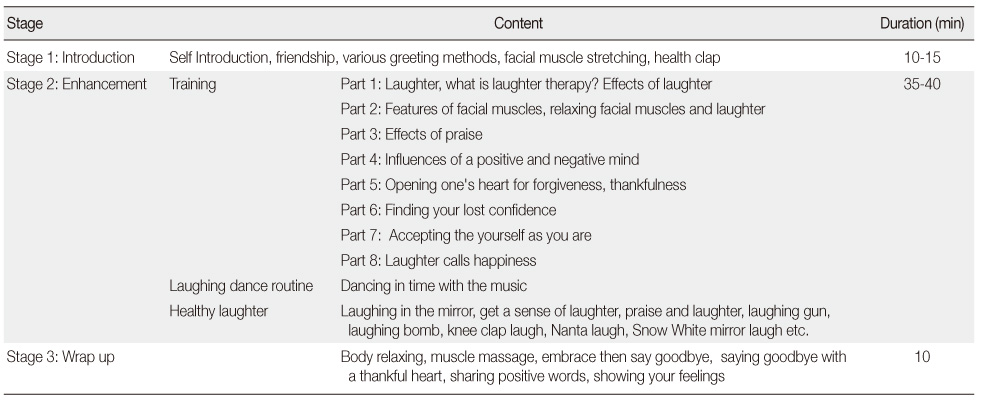
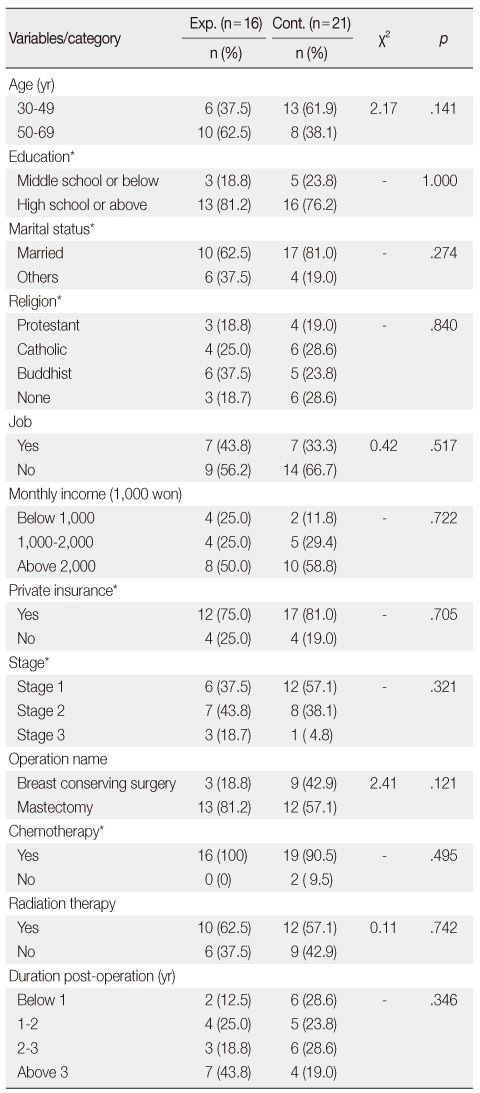
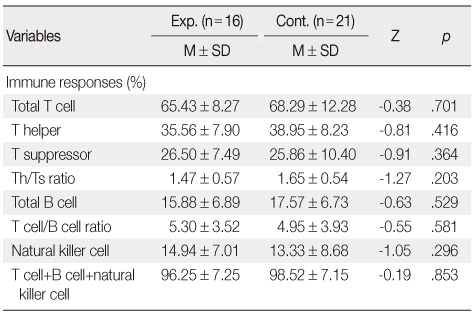
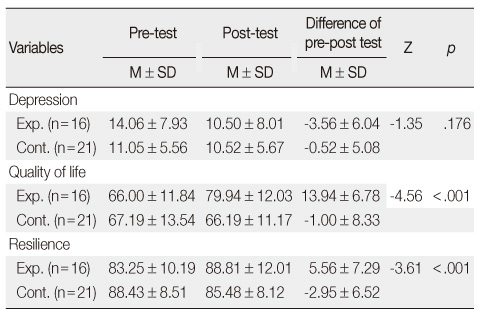
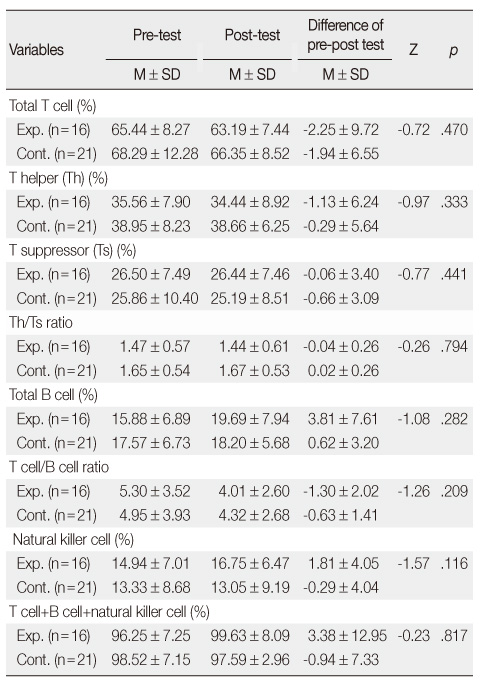
 Cite
Cite

